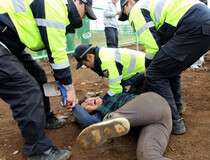hankyoreh
Links to other country sites 다른 나라 사이트 링크
Gangjeong Village's `outside forces'

By Huh Ho-joon, Jeju Correspondent
In addition to the residents battling the Jeju naval base construction, there are other peace activists staying at Gangjeong village in Seogwipo, Jeju. These are the activists the conservative media refer to as “outside forces.” They have played a crucial role in alerting the world to the blasting of Gureombi Rock and the situation in the village through Twitter and other social media. They have united spontaneously, without anyone’s direction, each with a different reason for opposing the naval base.
Catholic priest Moon Jeong-hyeon is the central figure among the “outside forces” working in Gangjeong. He stands at the front of the demonstration with his sun-darkened face, receding white hair, bushy white beard, and modified hanbok outfit, holding a cane in one hand. Moon is now a villager himself, having moved to Gangjeong over the course of the naval base battle.
“Just like in Maehyang Village [the site of a USFK firing range] and Daechu Village [location of the Pyeongtaek US military base], they are using all sorts of illegal tactics and buyoffs to build the naval base in Gangjeong village,” Moon said.
“I just wanted to help the residents in some way,” he added.
Park Seong-su, a 39-year-old from Gunsan, North Jeolla province, who is better known in Gangjeong by the nickname “Dongguri,” has been residing in the village since July 15 of last year.
“I came here to meet Father Moon, and it ended up being the day when three residents were arrested, including Go Gwon-il, the head of the committee to oppose the naval base,” Park recalled.
“I‘ve stayed because I was enraged at the disappearance of law and justice,” Park said.
Bang Eun-mi, 52, came to Gangjeong around the same time from a career in theater. She worked for over ten years as head of the Arirang theater company in Seoul’s Daehangno neighborhood. With the Nabi theater company, she did theater that focused on the issue of the “comfort women” drafted as sexual slaves for the Japanese military during the colonial occupation of Korea.
Bang became an “outside force” after a chance visit to Gangjeong.
“I haven‘t left because it seemed to me a dereliction of human love and conscience to do so when I knew how Gangjeong village residents were suffering at the hands of state authorities,” Bang explained.
The peace activists of Gangjeong village said they were not “outside forces,” but “forces for peace,” The eye-catching banner that waves at the junction in their current home reads, “You may be the smallest village in Korea, Gangjeong, but the peace that starts with you will reach the whole country!”
Please direct questions or comments to [englishhani@hani.co.kr]
Editorial・opinion
![[Column] Park Geun-hye déjà vu in Yoon Suk-yeol [Column] Park Geun-hye déjà vu in Yoon Suk-yeol](https://flexible.img.hani.co.kr/flexible/normal/500/300/imgdb/original/2024/0424/651713945113788.jpg) [Column] Park Geun-hye déjà vu in Yoon Suk-yeol
[Column] Park Geun-hye déjà vu in Yoon Suk-yeol![[Editorial] New weight of N. Korea’s nuclear threats makes dialogue all the more urgent [Editorial] New weight of N. Korea’s nuclear threats makes dialogue all the more urgent](https://flexible.img.hani.co.kr/flexible/normal/500/300/imgdb/original/2024/0424/7317139454662664.jpg) [Editorial] New weight of N. Korea’s nuclear threats makes dialogue all the more urgent
[Editorial] New weight of N. Korea’s nuclear threats makes dialogue all the more urgent- [Guest essay] The real reason Korea’s new right wants to dub Rhee a founding father
- [Column] ‘Choson’: Is it time we start referring to N. Korea in its own terms?
- [Editorial] Japan’s rewriting of history with Korea has gone too far
- [Column] The president’s questionable capacity for dialogue
- [Column] Are chaebol firms just pizza pies for families to divvy up as they please?
- [Column] Has Korea, too, crossed the Rubicon on China?
- [Correspondent’s column] In Japan’s alliance with US, echoes of its past alliances with UK
- [Editorial] Does Yoon think the Korean public is wrong?
Most viewed articles
- 1‘We must say no’: Seoul defense chief on Korean, USFK involvement in hypothetical Taiwan crisis
- 2N. Korean delegation’s trip to Iran shows how Pyongyang is leveraging ties with Moscow
- 3‘Weddingflation’ breaks the bank for Korean couples-to-be
- 4Korea sees more deaths than births for 52nd consecutive month in February
- 546% of cases of violence against women in Korea perpetrated by intimate partner, study finds
- 6Will NewJeans end up collateral damage in internal feud at K-pop juggernaut Hybe?
- 7[Column] Park Geun-hye déjà vu in Yoon Suk-yeol
- 8[Editorial] New weight of N. Korea’s nuclear threats makes dialogue all the more urgent
- 9Amnesty notes ‘erosion’ of freedom of expression in Korea in annual human rights report
- 10“Parental care contracts” increasingly common in South Korea